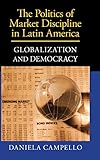The politics of market discipline in Latin America : globalization and democracy / Daniela Campello
Material type: TextLanguage: English Publication details: Cambridge : Cambridge Univ. Press, 2015Description: 239 p.: ill.; 24 cmISBN:
TextLanguage: English Publication details: Cambridge : Cambridge Univ. Press, 2015Description: 239 p.: ill.; 24 cmISBN: - 9781107039254
- 332.0415098
- 100 HG 5160.5 C193p 2015
| Item type | Current library | Home library | Collection | Shelving location | Call number | Copy number | Status | Barcode | |
|---|---|---|---|---|---|---|---|---|---|
 Libro
Libro
|
Biblioteca Juan Bosch | Biblioteca Juan Bosch | Recursos Regionales | Recursos Regionales (2do. Piso) | 100 HG 5160.5 C193p 2015 (Browse shelf(Opens below)) | 1 | Available | 00000144087 |
1. Globalization, democracy, and market discipline; 2. Between votes and capital: redistribution and uncertainty in unequal democracies; 3. Investors' 'vote' in presidential elections; 4. The politics of currency booms and crises: explaining the influence of the investors' 'vote'; 5. Currency crisis, policy switch, and ideological convergence: presidential elections in Brazil; 6. Exogenous shocks and investors' political clout: presidential elections in Ecuador; 7. Controlling for incumbency: financial markets' influence in Chavez's Venezuela; 8. 'Vivir con lo nuestro': default and market discipline in Argentina; 9. Who governs?: market discipline in the developed world; 10. Conclusion.
Daniela Campello uses a multi-method approach to challenge the notion that financial markets exert a broad influence over economic policy making in emerging economies. In Latin America, this influence varies between countries and over time, depending on cycles of currency booms and crises that are swayed by international commodity prices and US interest rates.
There are no comments on this title.

